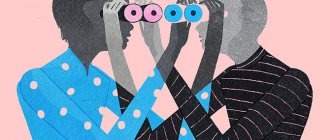After a stroke, a 49-year-old man from Brazil has changed a lot. He became kind and generous - even too generous. Having met homeless children on the street, he gave them all his money. He left his office job and opened a company selling homemade fries. The business failed: the man gave away most of the food for free. It was only thanks to the close attention of his wife that the family did not plunge into debt.
It turned out that after a stroke the man had damage to the part of his brain that is responsible for controlling emotions and making decisions. He felt a desire to help - and immediately got down to business, without taking into account other factors.
It is no coincidence that the ability to empathize is considered a virtue. Without empathy, we would not be able to go beyond our own self, understand other people's emotions, or create trusting and close relationships.
Empathy also exhausts, misleads and pushes to unfair actions. Guided by the most noble feelings, we often cause harm not only to ourselves, but also to other people.
Against empathy
When psychologist Paul Bloom wrote Against Empathy, even some of his students thought he had gone too far. If you oppose empathy, it sounds to society like you hate kittens. According to popular speaker and author Brené Brown, “empathy has the power to dissolve shame, break down feelings of disconnection, unify, and even heal.” And you claim to be against empathy? You must have made a bad joke.
Psychologists distinguish three main types of empathy:
- Emotional empathy
is the ability to experience the same feelings and emotions as another person. It occurs in infancy: when one child cries, another begins to cry.- Cognitive empathy
is the ability to put yourself in another person's shoes and understand how they think. This is an intellectual process that is already far from an involuntary reaction.- Empathic concern
is the ability that motivates you to care for and help other people.
Paul Bloom and some of his colleagues are most concerned about the first type, emotional empathy. Intuitively, it seems that the ability to sense other people's emotions should automatically encourage good deeds. It is no coincidence that psychopaths—people whose emotional empathy has atrophied—have a reputation for being cruel and ruthless. But in practice everything is much more complicated.
In a large study, researchers from the University of Minnesota found almost no relationship between aggression and low levels of empathy.
It turned out that what makes people aggressive is not a lack of empathy, but poor control over impulses and emotions.
Even among psychopaths, not everyone becomes maniacs and rapists. People with autism and Asperger's syndrome, despite problems with empathy, often adhere to very strict moral rules.
Empathy does not protect against aggression—it is through appeals to compassion that people can be pushed to commit monstrous acts. “When people think of empathy, they think of kindness. And I’m thinking about war,” writes Paul Bloom.
“Atrocities of all kinds tend to be motivated by stories of victims—white women attacked by blacks, stories of German children attacked by Jewish pedophiles.”
We sympathize with “our own people” - and that is why we become more aggressive towards “strangers”. You can call for Christian virtues as much as you like, but empathy doesn’t work that way. Try to empathize with the person who killed your friend.
It is not necessary to use such a radical example. In one famous study, football fans had to watch other fans being given pain using electric shocks. In brain scans, it was noticeable that fans only empathized with fans of their own club, and in other cases the empathic response was suppressed. Moreover, the suffering of fans of a rival club activated the brain centers associated with pleasure.
Empathy does not always make us kind and fair - often everything happens exactly the opposite.
Suspicious
You constantly need to hear from the person that everything is okay. Look to your friends for confirmation that your relationship with your boyfriend is normal. Decipher his actions. Even if your partner directly says that everything is fine with you, this will not completely convince you.
Such suspiciousness is again due to problems with intuition. You need facts and words because you have a problem with feelings.
1
Read on topic: 9 signs that you are a hypochondriac in a relationship
When there is too much compassion
The ability to share other people's emotions can become an unbearable burden. Highly empathic people and specialists in helping professions - nurses, doctors and psychotherapists - are well aware of this.
A specialist in the field of rehabilitation programs, Mark Stebnicki, introduced the concept of “empathic fatigue.” Constantly dealing with the grief and loss of others, people experience burnout—feelings of emptiness, physical exhaustion, and loss of interest in life.
Studies of nurses have shown that “compassion fatigue” leads to absenteeism and frequent medication errors.
The hypothesis that empathy encourages altruism has been studied for many years by American sociologist Professor Daniel Batson. “Empathy helps break down the boundaries between one person and another, it opposes selfishness and indifference,” he argues. But the reserves of empathy are not limitless. Fortunately, you don't have to share their emotions to help another person. Much often, a more productive step is to curb your feelings and look at the situation from the outside.
When compassion goes too far, we stop thinking about other people - we are too concerned about our own suffering. For empathy to be useful, it must be contained and directed in the right direction.
One day in Nepal, a young woman named Sita came to me for consultation. Her sister just committed suicide. She was haunted by guilt for not being able to prevent this. Unable to concentrate on anything, she cried for days on end, and when the tears stopped, she fell into a stupor.
During one of our sessions, she looked me straight in the eye and said, “Do you know what it’s like to lose a sister? I won't survive this. Since I was born, we lived in the same bedroom, we did everything together. I couldn't hold her."
Her suffering was so intense that it took me by surprise. I remembered the suicide of my sixteen-year-old cousin. I had to make a huge effort to pull myself together and not burst into tears. The depth of emotional resonance completely amazed me. But I knew that if I cried with Sita, I would not be able to help her.
I managed to calm down and stop thinking about my pounding heart, my eyes blurred with tears, and suppress the memory of my brother. Finally, when the intensity of emotions had subsided, I said to Sita: “I understand your grief. I really understand you. But you are not alone. I also lost a cousin at almost the same age as you. I know how hard it is. But I understood and accepted the fact that there was no way I could stop it. It is not my fault. This pain can be overcome.”
She suddenly raised her head and looked straight into my eyes to see if I was telling the truth. Much to my surprise, she stood up and hugged me, muttering, “I’ll try. Thank you".
From the book “Altruism: The Power of Compassion to Change Yourself and the World” by Mathieu Ricard
During a quarrel, you want to offend the person
You do not treat conflicts as a way to find a compromise and solve a problem. This is a fight in which you need to defend and attack. Therefore, you are not trying to convey anything specific, and certainly not listening to your partner, but only blaming. Don’t hold back your expressions and don’t think that words spoken in anger will affect the relationship after you make peace.
If you want to build healthy communication with others, you will have to learn how to conflict correctly. Express your opinion, talk about your own emotions, without attacking your interlocutor.
From empathy to rational compassion
Mathieu Ricard is called “the happiest man on earth.” A Buddhist monk and former doctor of molecular biology has become the subject of pioneering research into the effects of meditation on the brain.
In one experiment, he was asked to look at photographs and empathize with the suffering of the people who were depicted in them. “The empathic resonance very quickly became unbearable for me. I felt emotionally exhausted,” admitted Ricard. Then he came out of this state and focused on the feelings of love and care.
Instead of simply reflecting the other person's pain, love and compassion meditation activated completely different parts of the brain.
Researcher Tanya Singer from the Society. Max Planck repeated this study on 60 volunteers who were not monks. In the first group, participants developed a sense of empathy for others, and in the second, they practiced meditation on love and compassion.
Participants from the first group experienced more stress and negative emotions - the difference was noticeable after just eight hours of training. Compassion meditation quelled empathic stress and cultivated a sense of caring and willingness to help others.
True altruism has little to do with emotional empathy, many researchers believe.
Empathy quickly depletes, limits our circle of concern to one person and pushes us to ineffective decisions. Intense feelings are a poor guide when it comes to moral choices.
So, in a study by Daniel Batson, participants were told about a ten-year-old girl named Sheri Summers with a terminal illness - she was waiting in line for treatment that was supposed to reduce her pain. Participants were then asked to move the girl to the front of the line. When they were simply asked if it was worth doing, they refused - after all, there are other children who need help. But if participants were first asked to imagine how Sheri was feeling, they decided that she was the one worth helping. Compassion turned out to be stronger than justice.
“Sadness must be curbed by all means to make the world a better place,” writes Oxford philosopher and ethicist William MacAskill. Calculation, not empathy, is what is needed if we truly want to help others. It's easy to feel like a noble altruist. It is much more difficult to bring real benefits to people.
Emotions are a poor assistant in the fulfillment of altruistic impulses. Sometimes noble intentions cause great harm.
Donations to Africa support oppressive regimes. Overprotective parents raise neurotic children who are incapable of adulthood. Wars and conflicts are fueled by compassion for the victims.
Reckless empathy for a few can lead to disastrous consequences for all. But while empathy has its limits, it certainly shouldn't be abandoned entirely.
After traveling around the world on the Beagle, Charles Darwin became a staunch opponent of slavery. According to the modern theories of his time, whites and blacks had different origins: the blacks occupied an intermediate level between man and animal, and were treated accordingly.
Before the voyage, Darwin, like many Victorian gentlemen, thought this was quite fair. Only when he himself saw the suffering and humiliation of slaves did his opinion change - he began to consider slavery a disgusting and vile phenomenon. With the help of rationality he would hardly have been able to reach this conclusion.
Diagnosis of pathology
The term alexithymia is used to describe a high severity of personality trait as measured by the 20- or 26-item TAS, standardized instruments for measuring alexithymia. The most commonly used scale is the TAS-20, which contains 3 subscales related to the essential properties of measuring alexithymia:
- difficulty identifying feelings;
- difficulties in verbally describing feelings;
- externally oriented thinking style.
Alexithymia occurs in approximately 10% of the population, with a higher incidence in men than women. However, in clinical groups of patients with mental disorders, especially those dependent on psychoactive drugs, the rate exceeds 50%.











